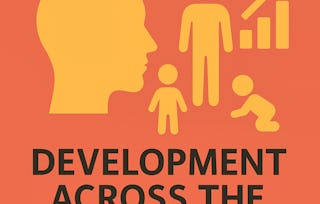In this course, we will explore how individual problem solving, judgment, and decision making can be influenced by interpersonal and developmental factors.

Interpersonal, Developmental, and Evolutionary Perspectives of the Mind

Interpersonal, Developmental, and Evolutionary Perspectives of the Mind
This course is part of Mind and Machine Specialization

Instructor: David Quigley
4,955 already enrolled
Included with
37 reviews
What you'll learn
Model the effects of multiple decision maker systems in various scenarios.
Analyze the Prisoner’s Dilemma and other Game Theory scenarios as a model of decision making and behavioral adaptation.
Discuss the relationships in genetic evolution models and developmental models of judgement and decision making.
Implement the design of autonomous agents as artificial life.
Skills you'll gain
Details to know

Add to your LinkedIn profile
See how employees at top companies are mastering in-demand skills

Build your subject-matter expertise
- Learn new concepts from industry experts
- Gain a foundational understanding of a subject or tool
- Develop job-relevant skills with hands-on projects
- Earn a shareable career certificate

There are 4 modules in this course
This week we will explore how individual decision rules and heuristics can create higher-order outcomes when applied in groups.
What's included
1 video1 assignment2 discussion prompts
This week we will explore mathematical models of different decision processes in game theory scenarios.
What's included
3 videos3 assignments1 peer review3 discussion prompts2 plugins
This week we will explain how different game theory models of decision making can model evolutionary processes and how different behaviors can be supportive of species survival from an evolutionary perspective.
What's included
4 videos2 readings2 assignments1 peer review1 discussion prompt
This week we will discuss how different behaviors of biological life can be reproduced in artificial systems.
What's included
2 videos3 readings1 peer review1 plugin
Earn a career certificate
Add this credential to your LinkedIn profile, resume, or CV. Share it on social media and in your performance review.
Instructor

Offered by
Explore more from Algorithms
 Status: Preview
Status: PreviewO.P. Jindal Global University
 Status: Free Trial
Status: Free TrialArizona State University
 Status: Free
Status: FreeUtrecht University
 Status: Preview
Status: PreviewUniversity of Leeds
Why people choose Coursera for their career

Felipe M.

Jennifer J.

Larry W.

Chaitanya A.
Learner reviews
- 5 stars
59.45%
- 4 stars
29.72%
- 3 stars
0%
- 2 stars
5.40%
- 1 star
5.40%
Showing 3 of 37
Reviewed on Sep 24, 2020
Lack of Hints in Exercises makes it quite challenging. But the content is really good. If only the instructor was as good as the course content is...

Open new doors with Coursera Plus
Unlimited access to 10,000+ world-class courses, hands-on projects, and job-ready certificate programs - all included in your subscription
Advance your career with an online degree
Earn a degree from world-class universities - 100% online
Join over 3,400 global companies that choose Coursera for Business
Upskill your employees to excel in the digital economy
Frequently asked questions
To access the course materials, assignments and to earn a Certificate, you will need to purchase the Certificate experience when you enroll in a course. You can try a Free Trial instead, or apply for Financial Aid. The course may offer 'Full Course, No Certificate' instead. This option lets you see all course materials, submit required assessments, and get a final grade. This also means that you will not be able to purchase a Certificate experience.
When you enroll in the course, you get access to all of the courses in the Specialization, and you earn a certificate when you complete the work. Your electronic Certificate will be added to your Accomplishments page - from there, you can print your Certificate or add it to your LinkedIn profile.
Yes. In select learning programs, you can apply for financial aid or a scholarship if you can’t afford the enrollment fee. If fin aid or scholarship is available for your learning program selection, you’ll find a link to apply on the description page.
More questions
Financial aid available,
¹ Some assignments in this course are AI-graded. For these assignments, your data will be used in accordance with Coursera's Privacy Notice.

